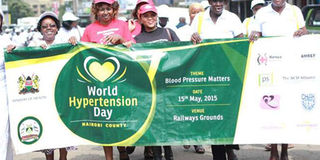Health body calls for action against rise of non-communicable diseases

Residents of Nairobi sensitise people about hypertension on July 16, 2015. Non-communicable diseases are rising. FILE PHOTO
What you need to know:
- NCDs are mainly caused by heavy reliance on tobacco use, harmful use of alcohol, poor diet and low levels of physical activity.
- The Acting Director of WHO’s NCD cluster Abdikamal Alisalad noted that the high rates of hypertension are particularly worrisome
NAIROBI
The burden of non-communicable diseases (NCDs), which has been gradually increasing over the past decade, will likely surpass the toll of sickness and death from infectious diseases in Africa by 2030, a World Health Organization (WHO) has said.
The study that was conducted in 32 countries in the continent shows that most adults in Africa have at least one risk factor that increases their chances of developing a life threatening heart disease, cancer, type two diabetes and chronic obstructive lung disease.
“These life threatening diseases are robbing people and families of those who otherwise should be enjoying their most productive years and place a significant hardship on the region,” WHO’s Regional Director for Africa Matshidiso Moeti said.
Dr Moeti observed that it is unfortunate that in recent years, much of the world’s attention and resources have been directed toward the immediate threat posed by emerging Zika and Ebola viruses.
According to the report, NCDs are mainly caused by heavy reliance on tobacco use, harmful use of alcohol, poor diet and low levels of physical activity.
In half of the African countries surveyed, one-quarter of adults had at least three of these risk factors, raising the probability that they will become ill with one or more of these conditions during the course of their lives.
The report says that the prevalence of hypertension in the African region is the highest worldwide, affecting an estimated 46 per cent of adults.
“In half of the countries in the African region, at least one in three adults was found to be hypertensive,” the report notes.
The Acting Director of WHO’s NCD cluster Abdikamal Alisalad noted that the high rates of hypertension are particularly worrisome, as hypertension is a silent killer, with most people unaware of their condition until it is too late.





